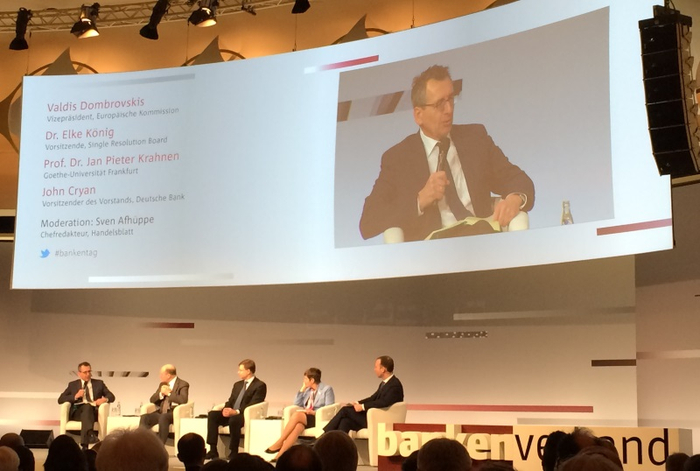“The rules are in place. A lot has been done on the European Union level, but the last mile of making the implementation effective is still missing,” SAFE Director Jan Pieter Krahnen introduced his statement on the banking union's completion at the 21st German Banking Congress in Berlin on 6 April 2017. Together with John Cryan (Deutsche Bank), Valdis Dombrovskis (European Commission) and Elke König (Single Resolution Board) Jan Krahnen discussed opportunities and challenges “On the way to the European single market for financial services – ambition and reality.”
The created system works well under greenhouse conditions, Krahnen stated. However, there is no proof or experience yet whether or not mechanisms such as TLAC (Total Loss-Absorbing Capacity) or bail-in will also work under real life conditions. Krahnen considers it crucial that national politics is not allowed to overrule political decisions on the European level. “However, that is exactly what we currently see.” National supervisory authorities acted contrarily to EU rules when they solve liquidity issues of banks in their own country in order to protect national interests. When the discussion took up the proposal of Andrea Enria, Chair of the European Banking Authority, to set up a European framework for non-performing loans, Krahnen came back to his initial thesis that we should insist on fulfilling the rules and resist a public bailout. “This is exactly the moment where implementation starts to hurt. If banks not manage to deal with their non-performing loans, they should leave the market,” Krahnen stated. Germany could act as a role model if it lets German banks exit the market.
The other panelists agreed that the banking union has not yet been completed. Cryan and König alluded also to the obstacles for the completion of a capital markets union, such as the missing harmonization of tax, property, enforcement, corporate and insolvency law. Dombrovskis emphasized the importance in times of Brexit to ensure a level playing field across member states. Competition among national supervisory authorities by lowering supervisory standards to attract business from the UK should be avoided, Dombrovskis stated.
According to Cryan, the EU needs a single venue for capital markets with a common set of rules that could also include the UK and Switzerland in order to have a competitive size. In Krahnen's view, this could be triggered by a consolidation of the Central Counterparty Clearing business in Europe – an event that would likely have happened automatically upon the merger of London Stock Exchange and Deutsche Börse. He added that the development of a single venue could also be supported by establishing a common market supervision in the sense of a European SEC. So far, market supervision has more or less been handled exclusively by the Bank of England since the European capital market is mainly located in the UK. Going forward, the required knowledge and experience to supervise markets need to be newly built up within the EU. Krahnen suggested that the European Securities and Markets Authority (ESMA) takes over the enforcement of market supervision for the entire EU in addition to its current role as a standard setter.


